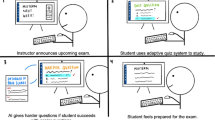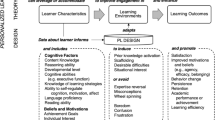Abstract
TEACHING AN EFFECTIVE ONLINE COURSE is a challenging experience. Although the content may be similar to that provided in a “traditional” course, the delivery, communication aspects, and management of an online course are quite different. In the past few years, course management systems have been developed that provide valuable tools for teaching and managing an online course.
This article presents an overview of the features of course management systems as they pertain to teaching online courses. Specifically, it identifies tools and techniques related to the effective use of management features, assessment options, instructional activities, and communication in online courses.
Similar content being viewed by others
References
Aluise, F. (2001). Kaleidoscope of designing, administering and teaching distance education. In J. Price, D. Willis, N. Davis, & J. Willis (Eds.), Proceedings of SITE 2001 (p. 113). Charlottesville, VA: Association for the Advancement of Computing in Education.
Arnone, M., & Galbraith, K. (2002, July 12). Course-management outfits still seek elusive profits. The Chronicle of Higher Education, 48 (44), p. A33.
Balsera, A.F. (2001). The road ahead: The evolution of online learning. In J. Price, D. Willis, N. Davis, & J. Willis (Eds.), Proceedings of SITE 2001 (pp. 11–16). Charlottesville, VA: Association for the Advancement of Computing in Education.
Blackboard Building Blocks. (2003). Blackboard, Inc. [Online]. Available: http://products.blackboard.com/cp/release6/BuildingBlocks.pdf [2003, February 17].
Campus Computing Project. (2001, October). The 2001 National Survey of Information Technology in US Higher Education: eCommerce comes slowly to the campus. Encino, CA. [Online]. Available: http://www.campuscomputing.net/pdf/2001-CCP.pdf [2002, December 8].
Carmean, C., & Haefner, J. (2002). Mind over matter: Transforming course management systems into effective learning environments. Educause Review, 37(6), 26–34. [Online]. Available: http://www.educause.edu/ir/library/pdf/erm0261.pdf [2003, February 17].
Collura, M. (2003, February). Not just another pretty course web site. Syllabus. [Online]. Available: http://www.syllabus.com/article.asp?id=7254 [2003, February 15].
Curtis, D.D., & Lawson, M.J. (2001, May). Exploring collaborative online learning. Journal of Asynchronous Learning Networks. 5(1). [Online]. Available: http://www.aln.org/publications/jaln/v5nl/v5nl_curtis.asp [2003, February 16].
eLearning Group. (2002). Results of the WebCT Student Survey — 2002. Georgia State University. [Online]. Available: http://www.gsu.edu/~wwwets/support/webct2002stdt_survey.html [2002, December 8].
Firdyiwek, Y. (1999, January-February). Web-based courseware tools: Where is the pedagogy? Educational Technology, 39(1), 29–34.
Foreman, J., & Widmayer, S. (2000, Fall). How on-line course management systems affect the course. Journal of Interactive Instructional Development, 13(2), 16–19.
Herrmann, N, & Popyack, J. L. (2003, January). Electronic grading: When the tablet is mightier than the pen. Syllabus. [Online]. Available: http://www.syllabus.com/article.asp?id=7094 [2003, February 16].
Hartley, K., Gibney, T., Heflich, D., & Strudler, N. (2001). Developing standards of quality for online courses. In J. Price, D. Willis, N. Davis, & J. Willis (Eds.), Proceedings of SITE 2001 (pp. 195–196). Charlottesville, VA: Association for the Advancement of Computing in Education.
Johnstone, S.M. (2003, January). Some light on the higher ed horizon. Syllabus. [Online]. Available: http://www.syllabus.com/article.asp?id=7097 [2003, February 15, 2003].
Jonassen, D.H. (2000). Computers as mindtools for schools: Engaging critical thinking. Upper Saddle River, NJ: Merrill.
Kieran-Greenbush, S. (2001). Teaching web-based distance education courses. In J. Price, D. Willis, N. Davis, & J. Willis (Eds.), Proceedings of SITE 2001 (pp. 118–120). Charlottesville, VA: Association for the Advancement of Computing in Education.
Lewis, L., Snow, K., Farris, E., & Levin, D. (1999). Distance Education at Postsecondary Education Institutions: 1997–98 (NCES 2000-013). U.S. Department of Education, National Center for Education Statistics. Washington, DC: U.S. Government Printing Office.
Long, P.D. (2003, January). Learning management systems: Seeking paradigms for collaboration. Syllabus. [Online]. Available: http://www.syllabus.com/article.asp?id=7096 [2003, February 15, 2003].
McCollum, K. (1997, October 31). A new industry sprouts up to help professors put courses on line. The Chronicle of Higher Education. p. A33.
Merideth, E.M., & Steinbronn, P.E. (2001). One size does not fit all: Designing distance education support. In J. Price, D. Willis, N. Davis, & J. Willis (Eds.), Proceedings of SITE 2001 (pp. 145–150). Charlottesville, VA: Association for the Advancement of Computing in Education.
National Education Association. (2000, June). A survey of traditional and distance learning higher education members. Washington, DC: National Education Association.
National Postsecondary Student Aid Survey (1999–2000). Washington DC: U.S. Department of Education. [Online]. Available: http://nces.ed.gov/surveys/npsas/ [2002, December 8].
Open Knowledge Initiative. (2002). What is the Open Knowledge Initiative? Massachusetts Institute of Technology. [Online]. Available: http://web.mit.edu/oki/proj/edu2002/OKI_white_paper/pdf [2002, December 8].
Powers, R. (2003). Meeting the challenges of becoming an online course developer. University of Maryland: Resources for Learning. [Online.] Available: http://www.umuc.edu/facdev/resources/challenges.html [2003, February 16].
Sikora, A.C., & Carroll, C.D. (2002, November). A profile of participation in distance education 1999–2000. National Center for Educational Statistics 2001-154. Washington DC: U. S. Department of Education. [Online]. Available: http://nces.ed.gov/pubs2003/2003154.pdf. [2002, December 8]
Testing, assessment, and survey applications for the e-Learning Market. (2003). Respondus, Inc. [Online]. Available: http://www.respondus.com [2003, February 16].
Young, J.R. (2002, April 19). Pricing shifts by Blackboard and WebCT cost some colleges much more. The Chronicle of Higher Education, 48 (32), p. A35.
Author information
Authors and Affiliations
Corresponding author
Additional information
ABOUT THE AUTHOR
Ann E. Barron is a Professor of Instructional Technology at the University of South Florida. She has been teaching online courses for the past seven years and has used a variety of course management systems, including WebCT, Blackboard, TopClass, and Web Course in a Box. She is currently teaching three Web-based courses and was a recipient of the first annual USF Online Teaching Award in 2002.
Rights and permissions
About this article
Cite this article
Barron, A.E. Course management systems and online teaching. J. Comput. High. Educ. 15, 128–142 (2003). https://doi.org/10.1007/BF02940856
Issue Date:
DOI: https://doi.org/10.1007/BF02940856




